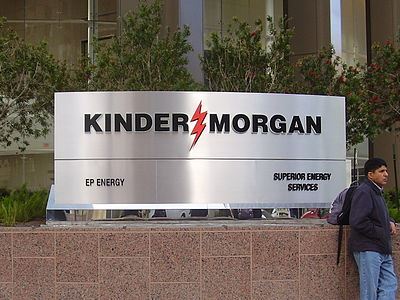
Distributable cash flow (DCF) is a non-GAAP measure that is roughly comparable to net income and is KMI’s preferred way of comparing basic cash flows to the cash dividends it expects to pay shareholders. Another way of looking at DCF is as coverage in excess of dividends. DCF for the second quarter totaled $0.50 per share, up from $0.32 in the year-ago quarter.
Kinder Morgan will pay a dividend of $0.49 per share to shareholders of record on July 31, up from $0.43 in the first quarter of last year and up from $0.48 sequentially. Before the dividend increase, the yield was 5.1%.
DCF is higher year-over-year primarily due to the merger transactions Kinder Morgan completed late last year. DCF for the quarter totaled $1.1 billion, compared to $332 million in the second quarter last year. Net income for the second quarter totaled $365 million, compared with $515 million in the year-ago quarter. The decline was driven by higher DD&A expenses, book taxes and interest expense.
ALSO READ: 4 Small and Midcap Energy Stocks to Buy Now
Chairman and CEO Richard Kinder had this to say about KMI:
While commodity prices continued to pressure the industry this quarter, we continued to produce strong results due mainly to our large, diversified asset portfolio and fee-based cash flows predominantly supported by take-or-pay contracts. … Our five business segments produced $1.827 billion in segment earnings before DD&A and certain items, up 2 percent from the second quarter 2014, primarily driven by increases in our Products Pipelines and Terminals segments offsetting a decline in our CO2 segment.
In its outlook discussion, KMI said it continues to expect to pay a total fiscal year dividend of $2.00 per share this year, a 15% increase compared with the 2014 dividend of $1.74. The company no longer expects to meet its budgeted cash coverage in excess of declared dividends target of $654 million. That total was based on an assumed average WTI crude oil price of about $70 a barrel and a Henry Hub natural gas price of $3.80 per million BTUs. Kinder Morgan’s realized average weighted price per barrel of oil in the first half of the year was $72.72. The realized average weighted price per barrel of natural gas liquids for the same period was $20.36. Last year Kinder Morgan realized a price of $90.35 per barrel of oil and $47.56 per barrel of natural gas liquids.
The company also announced on Wednesday that it has reached an agreement to acquire Shell’s 49% equity interest in the Elba Liquefaction Company for approximately $630 million, bringing Kinder Morgan’s investment in the natural gas export facility to $2.1 billion. Construction is expected to begin in the fourth quarter of this year, subject to regulatory approvals, and first production is due in late 2017.
ALSO READ: Why Deutsche Bank Is Bullish on 2 Clean Technology Yieldcos
Shares of KMI traded up about 0.5% Thursday morning, at $37.78 in a 52-week range of $33.25 to $44.71. The consensus price target on the stock was $47.17 before this earnings announcement.
Is Your Money Earning the Best Possible Rate? (Sponsor)
Let’s face it: If your money is just sitting in a checking account, you’re losing value every single day. With most checking accounts offering little to no interest, the cash you worked so hard to save is gradually being eroded by inflation.
However, by moving that money into a high-yield savings account, you can put your cash to work, growing steadily with little to no effort on your part. In just a few clicks, you can set up a high-yield savings account and start earning interest immediately.
There are plenty of reputable banks and online platforms that offer competitive rates, and many of them come with zero fees and no minimum balance requirements. Click here to see if you’re earning the best possible rate on your money!
Thank you for reading! Have some feedback for us?
Contact the 24/7 Wall St. editorial team.



